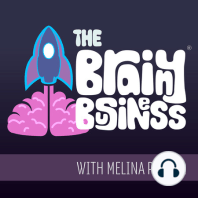51 min listen

46. Biases Toward Others – Including Groups
FromThe Brainy Business | Understanding the Psychology of Why People Buy | Behavioral Economics
46. Biases Toward Others – Including Groups
FromThe Brainy Business | Understanding the Psychology of Why People Buy | Behavioral Economics
ratings:
Length:
36 minutes
Released:
May 3, 2019
Format:
Podcast episode
Description
This is the second episode in the series on “all the biases” broken up into eight categories. Last week, I told you about all the personal biases (and the rules your brain uses to convince itself it is the most awesome and amazing thing in the world). Today, we are going to talk about all the biases that relate to other people and groups. We will start out with general biases, and then have sections about the biases that apply for people we are similar to and those we are different from. And, in case you are curious, the other six categories of biases we will cover in coming weeks are: memories, future versus present thinking, selective attention, math is hard, lazy brain, and finally novelty and stories. I’m so excited to break those all down for you! And as a reminder, this series is not about digging deep on any one topic, but instead giving you just a little taste of each bias and how you can use it in life and business. Each of these biases will likely get its own episode over time, but this will allow you to learn a little about them, and how they relate to each other, now. CLICK HERE FOR YOUR FREE DOWNLOAD! Show Notes [04:32] Intro to general biases toward other people and groups. [05:28] This first term is probably one you are familiar with: groupthink. This is essentially what happens when people are in groups, and either because they want to have a harmonious experience or not rock the boat…or just the herding mentality of humans, the people within the group start to make bad decisions. These could be irrational or different than what the person would choose to do if left to their own devices, and it is often in an attempt to minimize conflicts. [06:01] One way Amazon combats this is by having a silent start to meetings (and I linked to an article in Inc. about this in the show notes). Essentially, the leader of the meeting has to write a very well-thought out meeting prep document, which is presented at the beginning of the meeting, and everyone will sit and read it silently to themselves. [07:18] Shared information bias can be counterintuitive. [08:03] Bike shedding is when it's easier to talk about a simple topic instead of the one big topic that you should be talking about. [08:29] Be aware of the bandwagon effect in groups. [10:20] It's harder to build the snowball than to keep it moving so you will have more effort on the front end. [10:55] People look better and are more attractive when they're in a group then when they're by themselves. Remember, things are not always what they seem, so don't be intimidated. [11:57] Because of hostile attribution bias you might think that the group will be mean to you. [13:07] Stereotyping is a natural tendency and doesn't have to be hostile. It's expecting someone who's a member of a certain group to have certain characteristics. [15:04] Humans are complex and belong to all sorts of affinity groups that make up our identities. [16:09] The bulk of your perception of any person is based on their group affiliations and a stereotypical bias which may or may not be true or accurate for an individual. [17:52] Implicit association, which is how quickly a word comes to mind or matches with a previous word that was said. That can show how closely they are associated. [20:10] Because of the moral credential effect, if you have tended to not be prejudiced in the past…your likeliness to be prejudiced in the future is actually higher! [21:21] Fundamental attribution error is important to keep in mind when thinking about how we assess the actions and choices of other people. [22:10] When people experience the flip of this – thinking others’ behavior is due to a situation and their own behaviors are more about their personality, it is called extrinsic incentives bias. [23:25] When you make an internal attribution error to the whole group instead of the individuals that make it up, it is called ultimate attribution error. [24:04] When we apply this bias to individuals instead of a group, i
Released:
May 3, 2019
Format:
Podcast episode
Titles in the series (100)
1. Unlocking The Secrets Of The Brain: That is what behavioral economics is all about. And it is what I am so passionate about. by The Brainy Business | Understanding the Psychology of Why People Buy | Behavioral Economics